How does a person earn the nickname, Tomcat? The story goes that a girlfriend of Courtney’s in Waco, TX, who ran a little house out on the range, had just bought him a Cadillac. One day she got angry with him and chased him through the house with an axe! Yes, I said Axe! He jumped out one of the third story windows, broke his leg, hobbled over to the Caddy, and drove as far West as he could…Ocean Beach. Tom says, ‘Man, that woman was MEAN! She had a graveyard of her own!’ The nickname stuck and Tomcat Courtney has the scars to prove it.
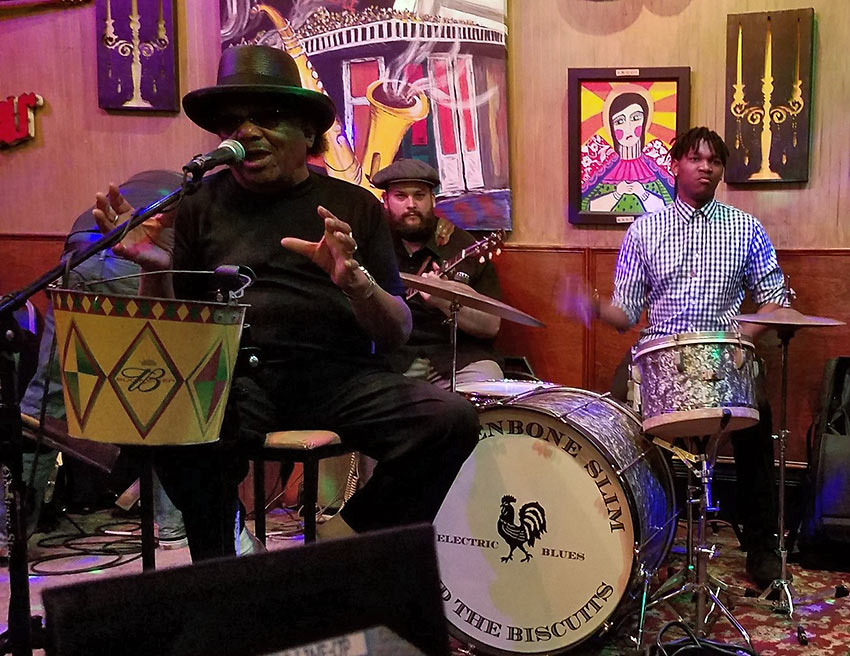
Courtney is currently preparing for his 89th birthday musical celebration at a local San Diego haunt, Proud Mary’s. As in years past, he’ll once again be surrounded by friends, fans and some of the best musicians in Southern California. His face may reflect a little more wear and tear, but he has the work ethic of a performer half his age. His mind is still sharp, his wit is still quick, and his blues can cut you clean to the bone. Tomcat Courtney is a living, breathing American treasure and is one of San Diego’s most revered and respected blues elders.
Born in Marlin, Texas in 1929, Tomcat Courtney is one of a very few surviving bluesmen that grew up in the depression era Texas cotton fields. Some of Tomcat’s earliest memories are the stuff of legends. Another well known name from Marlin was Blind Willie Johnson? “Yeah, I knowed him,” he nods. “But I was small, you know? I saw him play. I saw Robert Johnson when he was playing in this little old place out in the country. Most of them people played in the fall of the year, when cotton work was plentiful. They had a little change rattling around in their pockets. Back then there wasn’t no money, man. Robert Johnson was playing in San Antonio, Texas and Dallas, that was about 1937 or ’38. Right after that he died, I remember that, heard people talking about it, but I was just a kid about 8 or 9 years old.”
Who were some of the other musicians you remember from that time? “Sonny Boy Williamson.” Tomcat says. “My father had a little old joint; it was a barn he made a juke joint out of. Way out in the country you know, it had an old tin roof and when it rained…yaaaahh!!! He laughs! “It was loud, but tin was cheap.”
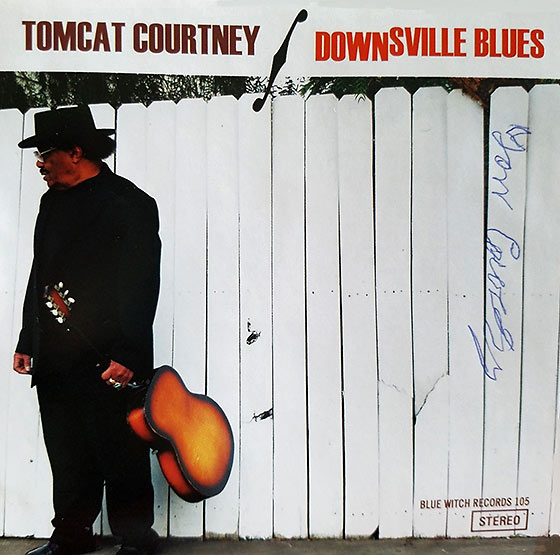
You were just a kid, were you allowed to attend shows at your father’s juke joint? “Well they had windows and they opened them up and bolted them up and I’d sit in the window. Especially when Lightnin’ (Hopkins) played. I was more enthused about Lightnin’ than Robert Johnson. I didn’t think about it until years later. Robert was kind of a drunk, he wasn’t jolly…you know what I mean? He played (breaks into song) ‘Went down to the Crossroads, fell down on my knees…’ like tears all the time, but Lightnin’ was jolly. You know the spirit they put into it. I remember that and the boogie he put into it. He had that ‘don-ta-don’ (cadence) to it. He used that quite a bit more than he do on his records, ‘cause peoples dancin’.” Tomcat begins to smile as the memories flood back. “So then when I saw him, I wanted a guitar. You see I had a harmonica, I used to try to blow a harmonica ‘cause I saw Sonny Boy Williamson blowing it, you know? (laughing) “He was the first that I saw that sat down and entertained people. He was the best I saw, he talked about so many things, the train… He mostly blowed about lovin’ his woman and kissin’ at night and this and that and makin’ the harp play the thing, make the harp cry.” He sings. “‘Mama!’ and all that, you know?” (He laughs and breaks into song) ‘Now call your mama…Mama, call your mama…Mama!’ (laughing)
How did you come by your first guitar? “Actually,” he smiles. “I got that guitar from a guy who had a garden. Everybody had big gardens and things back then. He had a Stella guitar the kind Leadbelly and them played, but he had a big, nice one but it had a little hole in it and I said, ‘I sure would like to have that guitar.’ He said, ‘I tell you what, you help me get these weeds outta’ the garden and I’ll give you this guitar.’ Man, I pulled up every weed out there. I had a pile of weeds that high.” He raises his hand above his head. “He gave me the guitar and I put some old strings on it, and that’s how I started.”
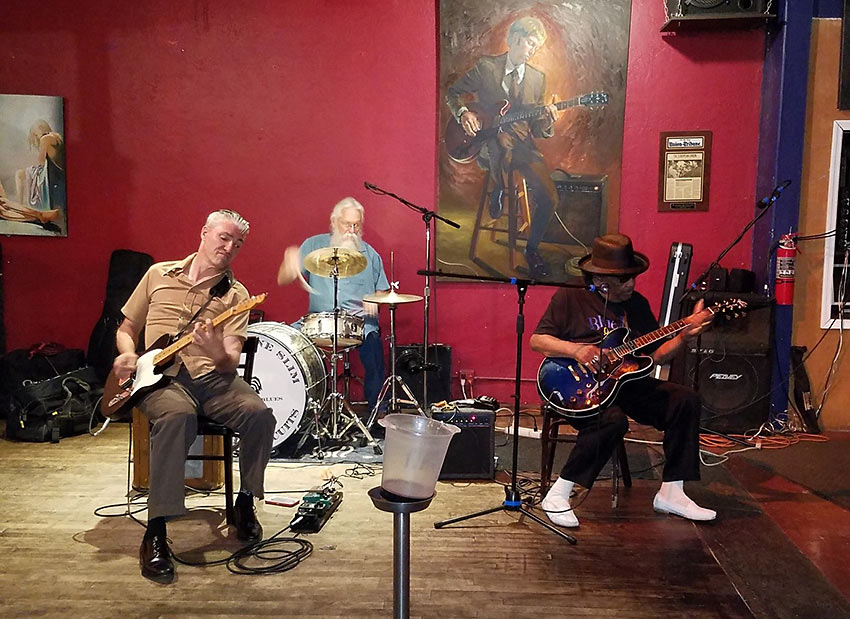
Texas Swing music was extremely popular back in those days; did you ever play that style of music? “When I started in a band, I played up tempo music and some swing stuff. I just didn’t get into it that much. I was mostly into the boogie style. You know Lightnin’ and John Lee was so prominent and when you go around in those joints in Texas the juke box had Lightnin’ Hopkins and later on John Lee Hooker they were just so prominent on the country jukebox. In ’48 or ’49 when John Lee Hooker put out ‘Boogie Chillen’ he’d just about taken over the country blues jukebox. And then Little John Jackson followed about 1950 and put out ‘Rock Me, Baby.’ They all recorded right there together about ’48 or ’49.
You also knew Ray Charles very early in his career? “When I first saw Ray Charles all I heard him play was Charles Brown and Nat King Cole. I talked with him, I said ‘Ray, play something different.’ He’d tell ya’ ‘Man, I can’t see and I got to live and people seem to like it.’ He said, ‘I got to live,’ you know?’ He always said that. I was a little older than Ray Charles, about a year. But that sucker, man when I was about 15, me and him started about that age, I used to run across him. He was with Lowell Fulson, he had it, man. He had somethin’!”
***************************
Let’s talk a little about how you ended up in Los Angeles. “I was living and working in Flagstaff, AZ in the late ‘50s and playing for lumberjacks,” Tomcat says. “It was nice but in two or three weeks it started snowing. And I was so surprised!” (laughing) “I didn’t know but Flagstaff was worse than Chicago, man. I didn’t know that. Ain’t this a bitch? And it snowed so bad till everything shut down. Bobby Bland was coming through there on their way to L.A. and Wayne (Bennett) got sick. He was the guitar player, the one on all them records, you know? I had met Bobby Bland in Lubbock, Texas years before. But he said, ‘I gotta’ get a guitar player because Wayne is so sick.’ So anyway we went to L.A. and I knew a lot of his songs. He had ‘Further On Up the Road,’ ‘I Don’t Want no Woman Tellin’ me What to Do.’ I couldn’t play it like Wayne, but shit, nobody could play it like that. Anyway, we went to L.A.”
Did you experience any memorable gigs in Los Angeles? “The Five-Four Club (Ballroom) was closing up. It had been there for years and they were tearing all that out. And before they tore it down they had every band in the world come in to play there for a week. So what happened, B.B., Muddy Waters, Lowell Fulson, Joe Turner, everybody was playing there during that week, every night. The place was just packed. A big sendoff, before it went. They had so many good names, though. They had all the blues players, T-Bone, but T-Bone was living around there then and all the Chicago players. Everybody who had a good name was there.”
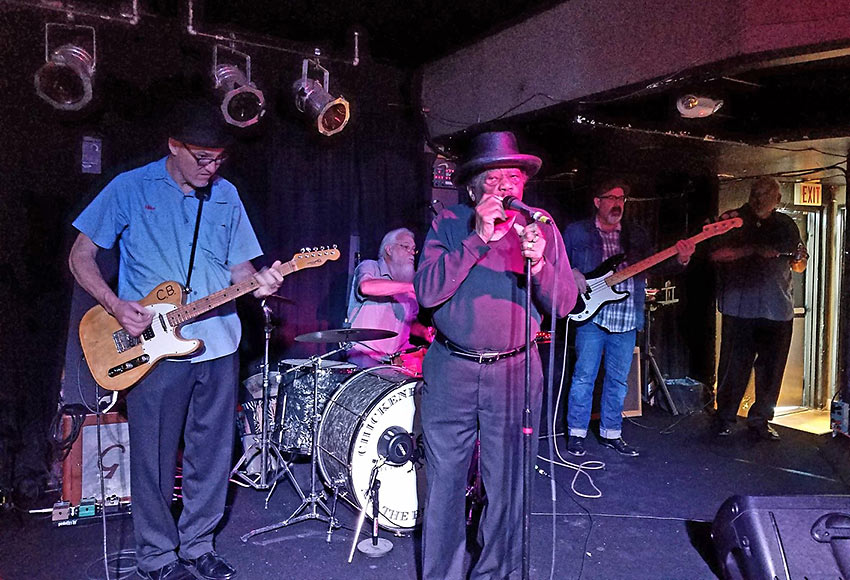
So when did you start coming down to San Diego? “We played down here about three or four times. The first place was called, the Black and Tan, and that closed and we played a place right next to it called, the Twilight Zone. When I come down here I liked it, but I knew I could get more work in L.A. L.A. and Chicago had more little places you could play in. More little after-hour stuff you could get in. But everybody in Hollywood went there to be movie stars and them that didn’t make it were crooks. So many people went there looking to try to make a living… and so many people went there to be something else. So when I came down here I messed around, I done two or three house parties and had little gigs. I said, ‘Man, these gigs are scarce here’ and I went out on Ocean Beach and a place called, ‘Peoples’ in ’69 or ’70. I walked in there and it was a hippie joint. I said, ‘Looky here man, I’m a blues player.’ He said, ‘I close here on Sunday, I just clean up on Sunday. I’ve got somebody playin’ ‘bout every night.’ Like a folk singer or one or two people and put up a tip jar and a percentage of the bar. And I said, ‘Well, I’ll do that. I’m here.’ He said, ‘Well if you want to set up and play, we don’t have anyone here on Sunday. And I’d like to hear what you sound like.’ He had a little old PA and I hooked up, had an acoustic guitar and I miked it up. I just carried that acoustic with me to audition to give ‘em an idea what I’m doin’ ‘cause when I tell ‘em Texas country blues, you know? They want to know what it sounded like.” (laughing)
“So I got up there and started playin’ and I saw the guy using the phone. He called like four people and the guys in the back cleanin’ up and he orders some beer. So they got a couple pitchers of beer. Another guy uses the phone and about six more people came. I wind up with like 30 people, man. The guy says this night was better than a week night and they wanna’ know if I’d be coming back next Sunday? I said, ‘Yeah, I’ll be back next Sunday. The next Sunday it was almost packed and the next Sunday there was people in line and they stayed that way for 15 years. And that’s how I stayed here. It started out as ‘Peoples’ and a guy bought it and called it the ‘Texas Teahouse.’ I played there about 24 years, all together. At one place.”
You’ve got to tell us a wild bar or club story before we stop. “Ah man, I played in so many places and there were a lot of them. Well, right there in Flagstaff, they started fightin’ them lumberjacks and stuff. The police come in there and almost closed the place up. Man, them dudes’d be big. I played in places where people were pulling guns and emptied the place. At Peoples’ one time a guy come in and cut two or three of us, man. Dude come in there and I liked to got killed. I think he got four of us, stuck one dude in the side and cut my arm, here.” (He points to the scar on his arm) “A nut come in there man, about six or seven years after I started playin’ there.”
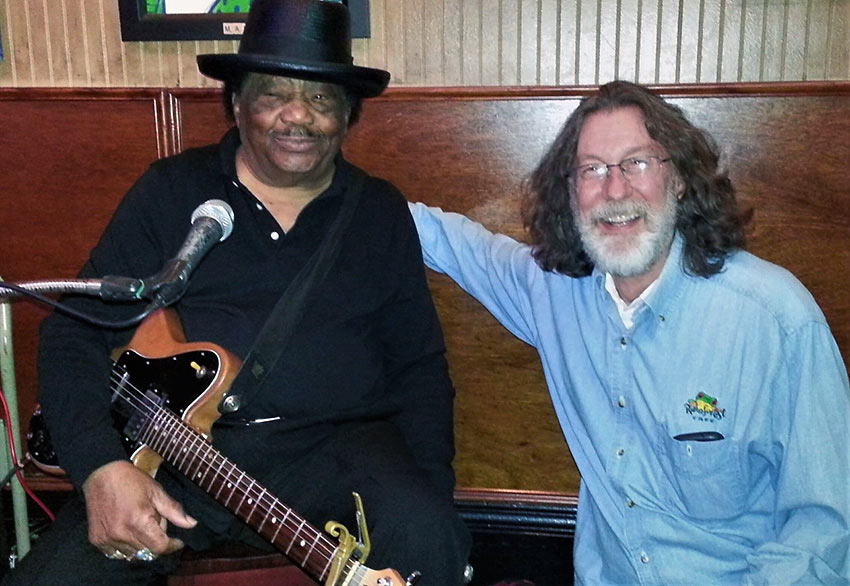
Tomcat’s fan base now circles the globe and he starts to laugh as he recalls touring Europe. “Man, that was somethin’ else. I went there a few times, Amsterdam and Switzerland. What happened is I made a CD, ‘Downsville Blues’ and everybody just dug it over there. Oh they really appreciate blues, they really appreciate it. Let me tell you, when I got to France I got up and went down to breakfast and all they had was fruit bullshit.” (laughing) “Looky here man, but when you go to lunch, O-O-O-O lunch and dinner, unbeatable them people’s cookin’. And they got a big thing of wine sittin’ up there. I say, ‘Goddamn, this shit don’t taste like Night Train!’ (laughing) “They have good wine there, man.”
Amazingly, you still write so much music, nine of the songs on Downsville Blues were originals? “I just write it…and sing it…shit.” (laughing) “I saw so many things and lived the way I lived. I went through some hell and stuff, the joints I played.
How do want history to remember Tomcat Courtney? “I don’t know, man. I think about all these people like Leadbelly, Blind Lemon Jefferson, T-Bone and I hope they’ll think of me that way… He was a bluesman.”
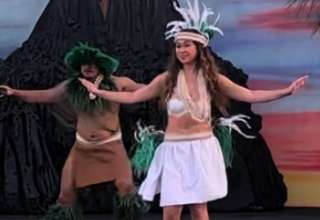
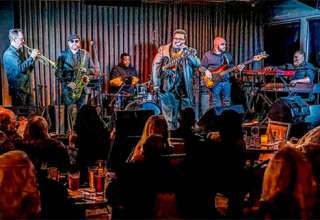
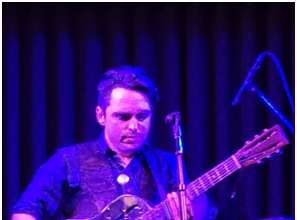
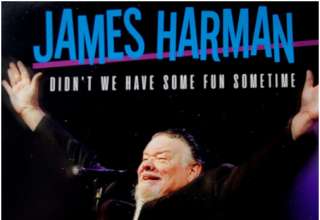
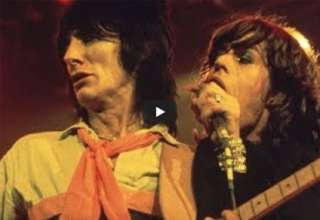
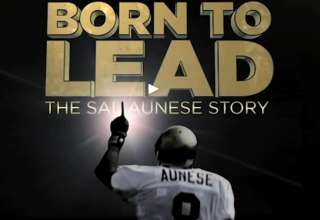

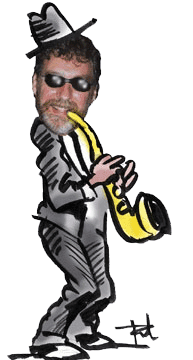 As a Defense Information-trained broadcast journalist and photographer, the road has taken him from the Far East Network in Tokyo, through the jungles of Central America, across the airwaves of Southern Europe to his final posting as the Chief of Radio and Television Sports for the global facilities of the American Forces Network. From on-air and studio production work in Hollywood to aerial photography from the open door of a Huey helicopter, Mr. Mattox has a wealth of experience in broadcast journalism. During his military career, he shot classified footage of Honduran air strips and landing zones expressly for Senate Sub-Committee hearings. He wrote, voiced and produced the AFRTS music series, 'The Straight, Natural Blues' portions of which now reside in the Library of Congress. He has written blues biographical features and taken photographs that have been published in multiple national and international magazines.
As a Defense Information-trained broadcast journalist and photographer, the road has taken him from the Far East Network in Tokyo, through the jungles of Central America, across the airwaves of Southern Europe to his final posting as the Chief of Radio and Television Sports for the global facilities of the American Forces Network. From on-air and studio production work in Hollywood to aerial photography from the open door of a Huey helicopter, Mr. Mattox has a wealth of experience in broadcast journalism. During his military career, he shot classified footage of Honduran air strips and landing zones expressly for Senate Sub-Committee hearings. He wrote, voiced and produced the AFRTS music series, 'The Straight, Natural Blues' portions of which now reside in the Library of Congress. He has written blues biographical features and taken photographs that have been published in multiple national and international magazines.






Mix-Movie.com
October 15, 2019 at 5:04 pm
The San Diego Music Awards ceremony takes place Oct. 16 and once again, in the Best Blues artist category, musician, singer-songwriter Tomcat Courtney is nominated.